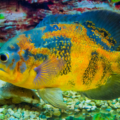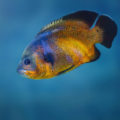Veil Tail Oscar is one of the most sought-after fish in the Oscar family. This species is known for its unique beauty and engaging nature.

Introduction to Veil Tail Oscar
Let’s talk about the elegant Veil Tail Oscar fish in depth!
The Oscar fish variety is a preferred choice among aquarium enthusiasts. They are known to be aggressive but also very brilliant and entertaining. Their personality and elegance make it easy to catch the attention of any fish hobbyist, making them one of the most popular aquarium fish.
History and Origin
The Veil Tail Oscar is a distinct Oscar fish variety. Scientifically known as Astronotus ocellatus, the Veil Tail fish’s history and origin are quite fascinating.
This fish variety is primarily found in the Amazon River basin of South America. They are native to countries in South America, including Brazil, Colombia, Ecuador, Peru and Venezuela.
The Oscar fish’s natural habitat is slow-moving waters in the Amazon River basin, commonly in areas with vegetation or submerged branches that serve as breeding grounds and provide shelter for this variety.
These South American cichlids were first discovered in 1831 and imported to Europe in 1929 to begin their journey in the aquarium trade. They were first successfully bred in the early 1930s creating a variety of color morphs and fin shapes that make them unique and visually appealing.
Physical Characteristics

The Veil Tail Oscar’s appearance and engaging personality are significant reasons why this fish variety is preferred by aquarists around the world. It is known for its unique features, especially its exceptionally long, flowing fins that add to their appeal. This elegant fish shows the following characteristics:
Body
This Oscar fish variety has an oval body with a large, pointed head and thick lips. It has the typical predator features—a large mouth with small teeth, fleshy lips and a mouth that protrudes, allowing it to eat its prey easily.
Size
They are large-sized fish and typically reach lengths of 12 to 14 inches (30-36cm) when fully mature. They get their maximum size at 3-4 years old and weigh 3.5 lb. (1.6 kg). Due to the Oscar fish’s size, they require spacious tanks that allow them to mature properly and provide ample space for them to swim and express their territorial nature.
Color
Veil Tail’s coloration encompasses a wide variety of vibrant colors and patterns. Some feature a dark base coloration with bright red or orange stripes running across their body; some variety display a more uniform red color, while some completely lack pigmentation, exhibiting a white body with light-colored eyes.
Unique Features
Veil Tail Oscar fish’s long fin is one of its striking and most notable features. Its fins are long, flowing and threadlike. It’s almost see-through and enhances their beauty as they sway elegantly in the water.
This Oscar fish’s physical traits, such as its robust body, vibrant colors and unique long fins, contribute to its charm.
Ideal Tank Setup

Veil Tail Oscars are large fish requiring large spaces to remain comfortable and healthy. The minimum tank size for this species should be at least 55 gallons, although I’d recommend you aim for 75-90 gallons if you want your pet completely stress-free.
Their aquarium setup should include tank decorations and structures that serve as hiding spots. You can incorporate live plants, artificial plants, and soft substrates like fine gravel or sand.
The water conditions of the tanks play the most important part in maintaining your fish’s health. Water parameters must be kept stable. The pH level should be maintained between 6 and 7.5, temperature should range from 74°F to 81°F (23°C to 27°C) and water hardness level 5 – 20 dGH.
Oscar fish filtration is also vital, especially because of the large amount of waste products produced by this variety. You must provide a high-quality filtration to maintain the quality and clarity of the water.
Feeding and Diet

Oscar fish are omnivorous, feeding on both plants and aquatic animals. The Veil Oscar’s diet should contain a well-balanced meal to stimulate their growth and provide the nutrients they need to thrive.
In the wild, they are known to feed on insects, larvae, plants, algae, fish etc. When recreating their diet, try as much as you can to make it similar to what’s available in their natural habitat.
Feeding an Oscar is relatively easy. A balanced diet for your fish should contain both live and frozen food. They feed eagerly on earthworms, crickets, prawns, fish fillets, grasshoppers, and other large-sized food.
Oscar fish nutrition must contain proteins that come from these live foods. Live food like bloodworms can be provided at an early age, but larger-sized fish require large-sized live food.
For more on feeding your aquatic pets check out The Ultimate Guide to Fish Food: Pros and Cons & Best Choices!
Health and Common Diseases
Like most fish, Veil Tail Oscar’s health is susceptible to various diseases and health problems. A key factor in preventing these illnesses is adopting efficient fish care mechanisms like proper tank maintenance and improved water quality. Here are some of the most common fish illnesses that you should be aware of:
· Ich: This is a common protozoan parasite that presents as white spots on the body and fins of the fish. This can be caused by poor water quality. To prevent the ich, maintain water parameters and perform regular water changes.
· Bacterial infections can cause white spots, red streaks and skin lesions. This can be treated with antibiotic treatments.
· Fin rot and tail rot: These are bacterial infections that cause the fins and tails of the fish to deteriorate. This illness can also be treated with over-the-counter antibiotics.
Disease prevention methods must be adopted by every fish owner to ensure their pet is in the best health. These methods involve detecting changes in behavior or physical appearance early and administering fish treatment as soon as possible.

Breeding Veil Tail Oscar Fish
Breeding the Veil Tail Oscar Fish is the most difficult part of owning this species. This is because they require large spaces and abundant food to facilitate breeding. Here are some basic steps to help you breed your Veil Tail Oscar successfully.
1. Conditioning the Oscar
The first thing is to prepare your fish for Oscar fish reproduction. You can start by separating the pair into a breeding tank and feeding them separately. This conditioning process makes them strong enough for breeding.
This video has been very helpful in identifying the sex of Oscar fish, I highly recommend it:
2. Spawning
To encourage spawning, boost the temperature in the tank to at least 80-85°F. This higher temperature helps trigger the breeding process. You should also introduce a flat surface or a slab for laying eggs. Breeding conditions must be stable to ensure both the parent and offspring are in the best shape.
3. Taking care of fry
Oscars lay thousands of eggs at a time, and the Veil Tail fry is hatched within 72 hours. Within 10 days, the fry could become free swimming and motile. These fry should be separated into a different tank and fed religiously until they become larger.
Behavior and Compatibility
Oscars are famous for their dominating and engaging personalities. They are intelligent and curious creatures and often recognize and interact with their caretakers.
Due to their size, they are also territorial and known to suppress other fish. They may also eat smaller companions.
The typical Veil Tail Oscar’s behavior may scare first-time fish keepers, but with patience, they get along well with other fish tank mates.
Oscar fish’s compatibility with other fish is the first thing to assess when choosing a tank mate for your Weil Tail Oscar. You must consider their temperament, behavior and size. Avoid pairing them with small fish and overly aggressive fish.
If you notice aggression among your Oscars and tank mates, you can manage the aggression by providing hiding spots, maintaining a well-decorated tank with obstacles and feeding them regularly. Fishes like the silver dollar are great tank mates for the veil tail oscar.

Conclusion
Veil-tail Oscar fish are a magnificent addition to any aquarium. They are famous for their engaging behavior, unique beauty and physical characteristics. A distinctive feature of this species is its long, flowing fins and vibrant colorations, which distinguish it from other fish.
Veil Tail Oscar care requires a lot of knowledge and commitment. If you are developing an aquarium hobby, this variety is one of the most important species to consider. Keeping Veil Tail Oscars is a straightforward process If you follow the fish-keeping tips provided in this care guide, you can be sure of a fulfilling journey.










